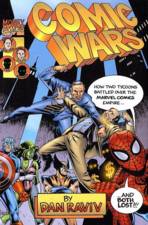

| Click on a book's image or title to order from Amazon.com |

Comic Wars
Broadway Books, HC, © 2002, 293 pp, ISBN #0-7679-0830-9Reviewed September 2003
Comic Wars is the chronicle of the Marvel Comics bankruptcy of 1997-1998. Written for laymen, it briefly describes the evolution of Marvel Comics into the dominant comic book publisher of the 1980s, at which point it was bought by investor Ronald O. Perelman in 1989. Perelman ran it for eight years, taking the company public and issuing bonds with its stock as collateral. In 1997, with the comic book market in significant decline, Marvel under Perelman declared bankruptcy.
Many of the bonds were bought up by fellow investor Carl C. Icahn, who attempted to wrest control of the company from Perelman during the bankruptcy. However a third side (with the banks owning many of the loans Marvel was obligated to repay belonging to banks, notable Chase Manhattan) was the small toy company Toy Biz, owned by one Ike Perlmutter and his comrade Avi Arad. Owning an in-perpetuity royalty-free license to use Marvel's characters, Toy Biz's existence depended on its part-owner, Marvel comics. Perlmutter embarked on a two-year voyage to merge Toy Biz and Marvel, or at least to find a way for Toy Biz to control its own destiny.
Comic Wars is a book long on legal maneuvering and short on sympathetic characters. Raviv points Toy Biz in the role of protagonist and underdog, so the reader is encouraged to root for them. But Perlmutter isn't particularly sympathetic either, and his behavior at the end of the book is likely to make anyone with a sympathy for Marvel, its characters, and its creators go, "Huh? I was rooting for this guy?" Like most of the other principals in the drama, Perlmutter is a businessman using Marvel as a means to an end. He doesn't care about - or even really know - the characters or the industry all that well.
Ultimately, the only sympathetic character (including the judges and lawyers) is Avi Arad, the toy designer who knows and cares about the characters and the companies, and who ends up being able to do some things we really wants as a result of the proceedings. He is, alas, only a minor figure in the ongoing financial struggle and can't really rescue the drama on his own.
As a legal drama, Comic Wars has its points of interest, but Raviv unfortunately misses the boat in making it appeal to people with an interest in comic books. Marvel's bankruptcy was one of a number of Marvel-related events in the 1990s which contributed to or were affected by the collapse of the comic book investment craze, and the continued doldrums of the industry have continued to affect Marvel. Moreover, it's widely believed that had Marvel actually gone under that the industry itself might have ceased to exist, or very nearly so. The place Marvel has in its industry is largely ignored by Raviv; he simply pays some lip service to Marvel being big and important, but of course it's more complex than that. Ultimately, the story Raviv tells is really only that of a few unsympathetic investors and a single company, whose welfare it's hard to really feel for.
I guess that Comic Wars isn't any worse than I'd expected, but I'd hoped it would range more broadly than just considering the strict legal and financial issues of the Marvel bankruptcy, and I think Raviv lost a good bet when he didn't widen his focus.
hits since 7 September 2003.